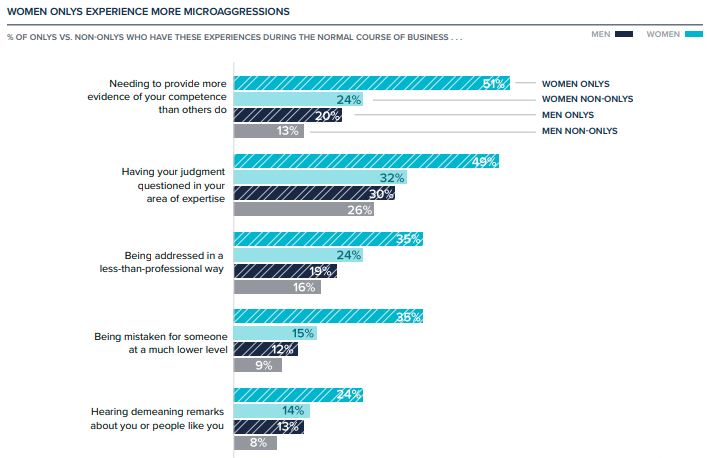Some of us end up being the “only” woman in a workplace environment because we didn’t have a choice. This article leans more towards those of you who have more of a choice — either are changing jobs or thinking actively about your next career move within an organization.
It can seem very glamorous or adventurous or ego-boosting at times to be the “only” woman in some space. It feels pioneering. It can make you feel special. Sometimes we seek it for selfish reasons, sometimes we seek it for altruistic and bigger-than-me reasons. A selfish angle may be to prove that you are a special brown girl who can compete at that level. A more altruistic angle may be to prove that brown girls can compete at that level. Whether you’re doing it to prove yourself or your group, I want to caution you on the “only” experience.
An “Only” is a woman who is the only or one of the only women in the room (there’s no hard line where the cut off is but say if your department is 10 people and you are 1 of 2 women, you could be classified as an “only”). Research by womenintheworkplace.com shows that being an “Only” is often a very negative experience for the person who is the only.
“One in five women is an Only, and they are having a significantly worse experience than women who work with more women.
Women in the Workplace report, 2018
For women of color, you are even more likely to be the only woman of color in a workplace setting.
Over 80% of women “onlys” report being on the receiving end of microaggressions at work vs 64% for women as a whole. The below chart compares the experience of “onlys” and “non-onlys” for both men and women:

Whilst it is good for shattering the glass ceiling and hats off to these women, the fact of the matter is that it can be a very isolating and lonely experience to be an “only” and you may not want to subject yourself to it forever. Of course there are exceptions, and that’s great if you are in a team where you feel you belong despite being the “only”. But for many of us, being an “only” is an experience we should try to avoid. There’s little glory in victimhood and unnecessary suffering. And often the fact that you are an “only” in the first place is a sign that there is something not quite right culturally in the organization – it shows they can’t find another woman or set of women to make the team more diversity-balanced along that one simple dimension (and there are so many more sophisticated ways of measuring diversity so this is just a basic one). Good luck trying to be the “only” person trying to change the culture!
How do we avoid the “only” experience?
- Look for diverse teams: When it came to changing jobs for me, I was looking out for how many women were in the TEAM I was recruiting for. Not just the organization, but the TEAM. Because your day to day is lived at the team level.
- If there is little diversity, do what you can to support and cultivate diversity: make the case for the next hire to be diverse or the contractor to be diverse
- Create cross-functional or cross-team opportunities for yourself to work with other women: if you have some control on who is involved in a project or what projects you put your hand up for, be thoughtful about making it improve your experience as a diverse candidate
There is a whole other can of worms which I think is under-researched but I have come across several women mention this to me anecdotally and experienced it myself: women can have a pretty terrible experience working with other women in some cases. They expected sisterhood but instead found less sponsorship, mentorship and support from other women than from male leaders. This is anecdotal right now, so I won’t dwell on the point too long, but I think back-biting behavior among women is more common in workplaces where there are fewer women and a feeling of scarcity around leadership positions that can “go to a woman”. When shopping for a new job, be on the vigilante for the feel of the workplace in both the explicit diversity as you look around and the sense of inclusiveness as you interact with people.
Being a woman of colour and working in all women division, I have experienced that other women do not like to see a woman of colour in a position of power. There was no sponsorship, mentoring or even mention of promotion to a new position within the division despite your dedication, hard work and knowledge in the field.
No recognition at all! And you feel worthless. Sad but true!